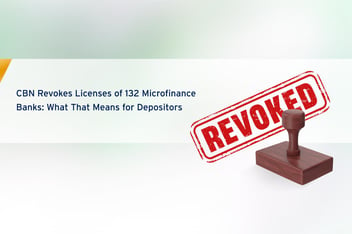.png)
What It Means to Be SEC-Licensed in Nigeria: Full 2025 Guide
Author Eyitemi Efole
If you’ve ever tried to invest in Nigeria or sign up with a financial service provider, you’ve probably seen the phrase “SEC-licensed” thrown around.
But what does it actually mean? And more importantly, why should you care?
In Nigeria’s fast-growing financial space, being SEC-licensed isn’t just a title. It’s a stamp of trust. A signal that an investment company or platform has passed through strict checks and is legally allowed to handle other people’s money.
Let’s break it down in a simple, human way.
The Nigerian SEC: The Watchdog That Protects Investors
The Securities and Exchange Commission (SEC) is Nigeria’s top regulator for the capital market.
Think of it as the referee that ensures fairness, transparency, and order in the investment ecosystem.
Here’s what the SEC does:
-
Protects investors from fraud, abuse, and shady operators
-
Regulates the buying, selling, and trading of securities (stocks, bonds, funds, etc.)
-
Supervises capital market operators — brokers, fund managers, crypto platforms, advisers, etc.
-
Enforces compliance with the Investments and Securities Act (ISA 2025)
-
Maintains confidence in Nigeria’s financial markets
Whenever you see “SEC-licensed,” it means the company has been examined and approved under this strict framework.
What Does Being SEC-Licensed Mean?
When a company says it is SEC-licensed, it means the SEC has officially recognized it as qualified to operate in Nigeria’s capital market.
Here’s what that status represents:
1. Legal Approval to Operate
Only SEC-licensed entities can legally provide capital market services.
Anyone operating without this license is breaking the law — simple.
2. Compliance With Strict Standards
To get a license, the company must prove it has:
-
The required minimum capital
-
A strong governance structure
-
Proper internal controls
-
Experienced, qualified professionals
-
A clean compliance record
3. Investor Safety
Licensing reduces the risk of fraud because the SEC ensures licensed firms follow rules designed to protect customers.
4. Market Credibility
Being SEC-licensed instantly boosts a company’s reputation.
Clients, partners, and even foreign investors trust licensed operators more.
Types of SEC Licenses in Nigeria
The SEC issues different licenses depending on what the business wants to do. Here are the most important categories:
1. Broker/Dealer
-
Buys and sells securities on clients’ behalf or for its own book
-
Typical minimum capital requirement: ₦300 million
2. Investment Adviser
-
Provides investment advice
-
Guides clients on where and how to invest
-
Helps manage securities decisions
3. Fund/Portfolio Manager
-
Manages people’s money professionally
-
Handles mutual funds, wealth portfolios, and institutional assets
4. Registrar
-
Keeps shareholder records
-
Manages share transfers, dividend payments, and company registers
5. Digital Asset Service Providers (DASPs)
-
New under the ISA 2025
-
Covers crypto exchanges, token service operators, custodians, etc.
-
Must now operate under full SEC regulation
Each license type comes with its own requirements and responsibilities.
What It Takes to Become SEC-Licensed (Requirements)
Getting SEC approval is not easy. Companies must pass through a rigorous multi-step process that includes:
-
CAC registration as a legal corporate entity
-
Meeting minimum capital requirements
-
Having sponsored individuals with relevant expertise
-
Securing a physical office address
-
Building a compliant operational structure
-
Completing SEC-mandated training and examinations
-
Submitting internal policies and risk-management frameworks
-
Passing background checks
The goal is to ensure only credible, stable, and knowledgeable players operate in Nigeria’s investment market.
Why You Should Only Work With SEC-Licensed Providers
Choosing a licensed operator gives you clear advantages:
1. Better Protection: Regulatory oversight reduces fraud, mismanagement, and unprofessional behaviour.
2. Clear Recourse When Things Go Wrong: If you have a complaint, you can escalate it to the SEC. This is impossible with unlicensed platforms.
3. Reliability & Professionalism: Licensed entities must maintain operational stability and follow strict rules, which means more consistency for you.
4. Transparency: They must file reports, disclose information, and follow auditing requirements. Nothing is hidden.
5. Peace of Mind: You’re dealing with someone accountable to a higher authority.
Post-Licensing Responsibilities (What SEC-Licensed Companies Must Maintain)
Getting licensed is just the beginning. Licensed firms must continuously meet the rules, including:
-
Annual license renewal (every January 31st)
-
Submitting regular returns and financial statements
-
Maintaining updated compliance frameworks
-
Filing AML/CFT (Anti-Money Laundering) reports
-
Meeting capital adequacy requirements
-
Undergoing periodic SEC inspections and audits
This ongoing supervision keeps the market safe for investors.
SEC Licensing and Digital Finance: What’s New?
Nigeria’s financial market is changing fast — and so is SEC regulation.
Under the ISA 2025, digital asset platforms (such as crypto exchanges and token providers) must now operate under SEC licensing.
This means:
-
Crypto platforms must meet compliance standards
-
Users get enhanced security and transparency
-
Digital finance is merging into the mainstream regulated market
It’s a major step toward stability in Nigeria’s digital economy.
Conclusion: Why SEC Licensing Matters More Than Ever
In a world filled with investment apps, crypto platforms, online “opportunities,” and influencers promising easy returns, SEC licensing is your number one filter for safety.
It tells you:
-
The company is legitimate
-
Your money is protected by law
-
There’s a proper governance structure
-
professionals are managing your investment
-
You have somewhere to report issues
Before you invest a single naira, always check that the platform is SEC-licensed.
You can verify through the SEC’s official database — or quickly cross-check using NairaCompare’s investment comparison tools.
About Author

Eyitemi Efole
Eyitemi Efole is exploring the marketing field, with a particular interest in brand management, strategy, and operations. She is keen on understanding how brands build trust and connect meaningfully with their audience.




.png?width=655&height=167&name=nC%20banner%20(2).png)
.png?width=628&height=212&name=blog%20header%20(39).png)



.png?width=352&name=quidax-Blog-anouncement%20(1).png)


